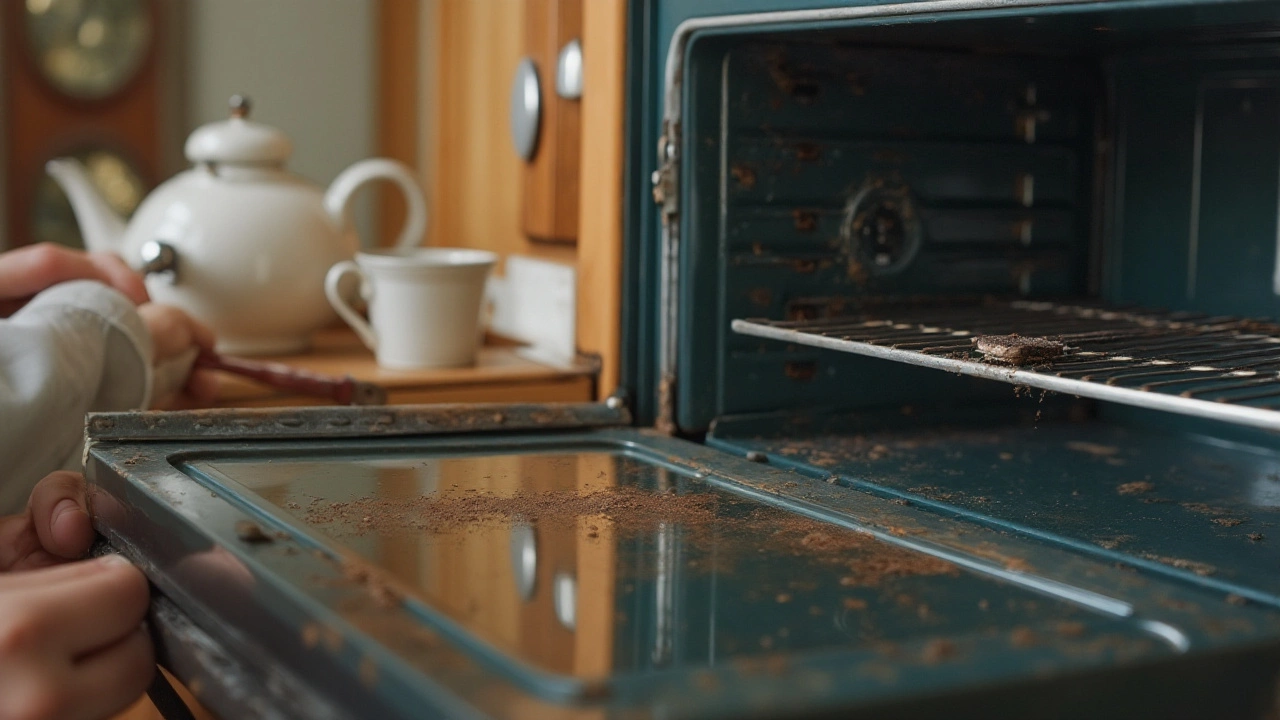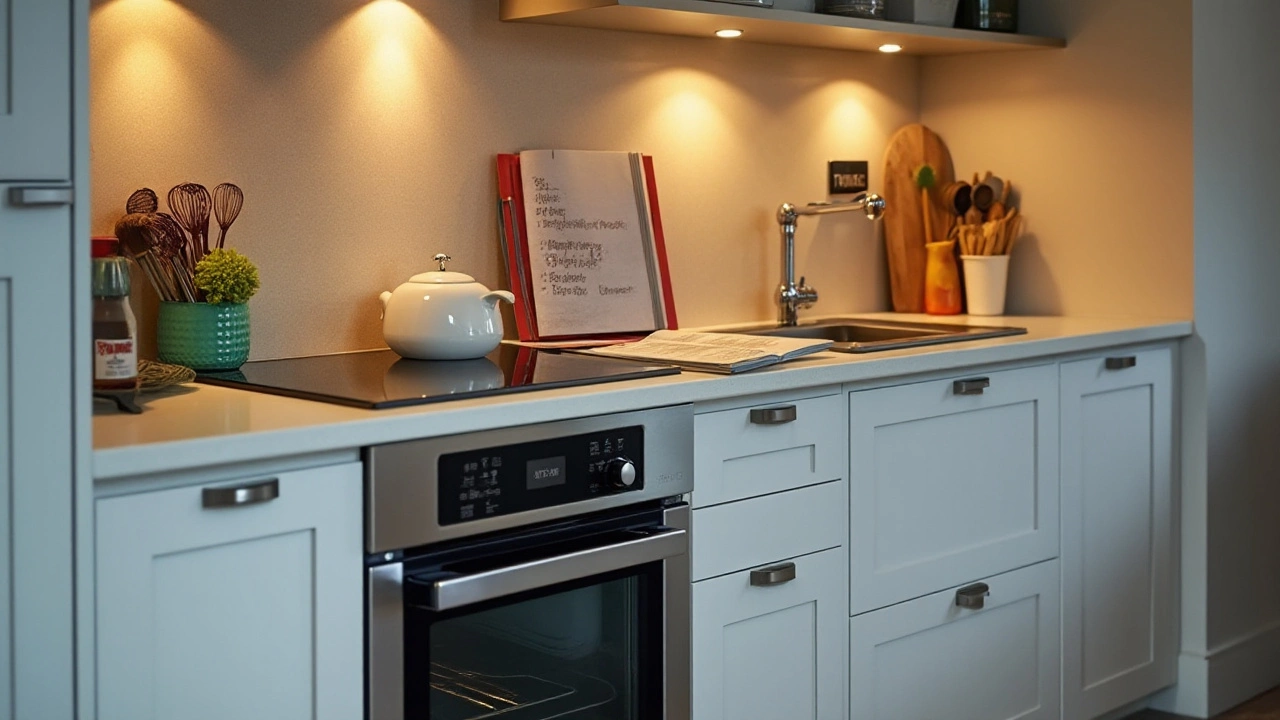Electric ovens are indispensable in today’s kitchens, offering a unique blend of efficiency and reliability. But just how long can you expect your electric oven to last? With countless hours of cooking delightful meals, it's no surprise that reaching a decade—or even two—is possible with proper care and attention.
While one might think the longevity of an oven solely depends on the brand or model, there are hidden aspects and easy-to-follow practices that can significantly extend your oven’s life. From understanding usage patterns to embracing simple maintenance routines, the secret to a long-lasting oven involves a bit of know-how and routine care.
Moreover, as technology advances, the introduction of smart features and energy-efficient designs adds a new dimension to durability. Join us as we explore various insights into maximizing your electric oven’s lifespan, keeping it roaring with life and ready to cook! Stay tuned for tips on how to ensure your electric oven stays in top shape, signs it might need some repair, and the impact of cutting-edge technologies on its longevity.
- Understanding Your Electric Oven's Lifespan
- Key Factors Influencing Durability
- Maintenance Tips for Prolonged Use
- Signs Your Oven Needs Repair
- The Role of Innovation in Oven Longevity
Understanding Your Electric Oven's Lifespan
From indulgent Sunday roasts to impromptu midnight baking, our trusty electric ovens are undoubtedly more than mere appliances; they are culinary companions. Yet, the question of their lifespan is one that puzzles many. With proper maintenance, an electric oven can keep you company in your kitchen for approximately 13 to 18 years. This varies due to several factors, including the type of kitchen appliances involved, the brand's reputation for durability, usage frequency, and how diligently maintenance tasks are performed. Understanding these components can not only extend the life of your oven but also preserve its cooking performance, ensuring every dish is a masterpiece.
One of the key determinants of an oven's durability is the wear and tear it experiences over time. Frequent baking or long roasts can hasten the depletion of certain components. However, technology plays a significant role in today's models. For instance, many modern ovens boast self-cleaning features which, if overused, might ironically reduce the lifespan due to high cleaning cycle temperatures stressing the oven's structure. Imagine using this impressive feature as a double-edged sword; it's convenient, yet requires a delicate balance in usage.
Looking back at traditional models versus contemporary ones, there’s a clear shift in manufacturing approaches aimed at extending product longevity. Data suggests that newer models often employ better materials and smarter designs, making them more efficient and resilient. However, these improvements don’t entirely remove the need for oven maintenance—they merely reshape it. Recognizing technology's impact on appliance lifespan, consider a quote from a reputable source:
"Our appliances today are like wine; aging doesn't diminish quality but enhances the experience when properly cared for."
In attempting to quantify lifespan expectations, remember the brand value. Renowned brands often outlive less expensive alternatives, primarily because they invest heavily in research and development. A statistical review by the International Appliance Researchers Association noted that high-end brands tend to offer a 20% longer service life due to rigorous testing and engineering excellence. To navigate the myriad of choices, think of your purchasing decision as an investment, focusing on reputed and consumer-friendly brands to enjoy a prolonged, hassle-free cooking journey.
Moreover, diving into the realm of everyday usage and personal habits can reveal surprising insights into your electric oven's longevity. Using large pots and pans can lower efficiency, forcing the oven to exert more energy to maintain set temperatures, which in turn downplays its lifespan. On the flip side, respecting the recommended maximum load and cleaning the oven periodically (without leaning too much on self-clean technology) can enhance durability. An interesting analogy could be seen in cars; regular servicing and balanced driving habits prolong a car's life much like careful oven use ensures it performs well over the years.
Two often overlooked factors are proper installation and placement. Ovens should be installed in well-ventilated spaces, allowing hot air to escape and prevent overheating. Also, checking the oven's leveling is crucial. An uneven base can lead to wear on certain components over time. Imagine placing a see-saw on rocky ground— the imbalance would inevitably wear it off more quickly. Understanding these nuances can save you repair headaches down the road and enrich your culinary experiences consistently over time.
Key Factors Influencing Durability
The lifespan of an electric oven is impacted by several elements, each playing a significant role in ensuring your appliance not only lasts but performs optimally throughout its use. First and foremost, the frequency of use is a crucial aspect. Ovens used daily, especially in large households, experience more wear and tear compared to those used occasionally. Each bake or roast contributes to the gradual degradation of internal components, hence regular maintenance and occasional rest periods can help extend longevity.
Another vital factor is the quality of the oven itself. Premium brands often employ higher-grade materials and advanced engineering, typically resulting in longer service life. These brands invest in innovative technologies aimed at improving efficiency and durability. However, it's important to note that even the most robust ovens require proper care to maximize their lifespan.
The environment in which the oven operates also has a considerable impact. Kitchens should be well-ventilated to prevent the buildup of heat that can strain the oven's internal mechanisms. In addition, the oven placement should avoid excessive exposure to moisture or extreme temperatures that might compromise its electrical components. Consistent exposure to such harsh conditions can lead to rust and corrosion, affecting the oven's overall durability.
Appropriate cleaning practices cannot be overstated. Regular cleaning prevents the accumulation of grease and food residues that can cause blockages and pose fire hazards. Yet, it's crucial to follow the manufacturer’s cleaning instructions. Some cleaning agents can be abrasive, causing damage to delicate parts.
"It's not just about cleaning regularly, it's about cleaning mindfully," says kitchen appliance expert, Jane Miller, who emphasizes the importance of knowing your oven’s material limits.
Moreover, the presence of timely and effective repairs contributes significantly to an oven’s lifespan. Addressing minor issues, like temperature inconsistencies or unusual noises, before they escalate can save costly repairs and early replacements. An annual inspection by a professional can pinpoint potential concerns that might not be immediately apparent.
Lastly, user habits such as proper preheating and using appropriate cookware can influence durability. Using ovens at their optimal temperature settings and ensuring the cookware is suitable for oven use can prevent unnecessary strain. Reducing drastic temperature fluctuations can ease pressure on the heating elements, making a notable difference in the long-term function of kitchen appliances.

Maintenance Tips for Prolonged Use
Keeping your electric oven in tip-top shape is simpler than you might think, and it starts with a few key practices. Regular cleaning is essential for any appliance, but especially for an oven. Oven interiors accumulate food residues and spills, which, if not addressed, can cause the appliance to work harder, affecting its longevity. Make it a habit to wipe the interior with a damp cloth after it cools down from use. It's advisable to conduct a deep clean monthly, employing a mild detergent or specialized cleaning agent, to tackle any stubborn grime and return the appliance to its gleaming form.
Checking and maintaining the fans and vents plays a crucial role in extending the lifespan of your oven. These components ensure the correct temperature is maintained, thus avoiding overheating, which can lead to critical damage over time. Regularly inspect these parts for clogs or debris. It's easy to overlook, but ventilating the system enhances efficiency and heat distribution, pivotal for the consistent performance of your oven.
"Taking proactive steps to clean and maintain kitchen appliances not only improves their efficiency but extends their service life,” notes appliance expert James C. Shubert.
Another step in the maintenance routine revolves around inspecting seals and gaskets. Heat retention is essential for energy efficiency, and compromised seals can allow heat to escape, causing the oven to consume excess energy. Gently run your hand around the edge of the closed oven door periodically; if you feel warmth, it might be time to replace the gasket. Keeping the door hinges clean is also important, as food particles can interfere with proper door closure, impacting performance and efficiency.
Repair tips should also include checking electrical components. Each year, take a moment to assess the power cord for any visible signs of wear or damage. These are crucial for preventing electrical faults. If your oven is equipped with a digital display or control panel, ensure these are functioning smoothly, as glitches might indicate underlying electrical issues. A swift response to these signs prevents small issues from blossoming into costly repairs.
Maintaining the right temperature calibration is another hidden factor that significantly affects the appliance's lifespan. When you suspect your food isn't cooking evenly or taking longer than usual, consider calibrating the oven temperature. Most ovens come with a default adjustment mode, allowing you to reset temperature settings to avoid premature wear on heating elements, ultimately sustaining both performance and longevity.
Additionally, an annual professional inspection might sound like an unnecessary expense, but it could be money well spent. Specialists have the tools and expertise to identify potential issues early before they evolve into major problems. This preventative step ensures your kitchen remains a hub of culinary delight without interruptions.
Signs Your Oven Needs Repair
Your electric oven may be one of those appliances on which you depend more heavily than you might realize. From morning breakfasts to lavish family dinners, it plays a pivotal role in transforming ingredients into delightful dishes. Still, when an oven begins to falter, it seldom speaks loudly. Rather, it whispers through a series of seemingly minor glitches and malfunctions. Recognizing these early warnings can prevent larger, more costly repairs or even the premature demise of your oven. Be attentive to these signs so you can maximize your oven's lifespan efficiently.
One of the most apparent signs of a troubled electric oven is inconsistent heating. If you're finding that your culinary creations are unevenly cooked, or if the preheat cycle drags beyond what's reasonable, there might be an issue with the heating elements. These elements can degrade over time or become coated with gunk and debris, diminishing their performance. Routine cleaning and inspections are vital, but if problems persist, a repair could be essential to restore the expected efficiency. Keep an eye out for erratic temperature readings or food coming out either undercooked or burnt despite accurate settings.
Unusual noises often serve as another indicator of internal issues. An electric oven should hum along smoothly during operation, so any grinding, squealing, or banging noises are cause for concern. These could stem from damaged fan blades, a failing motor, or even loose components that need tightening. Ignoring these sounds not only risks exacerbating the problem but could also lead to safety hazards. As an industry expert once said,
"Listen to your appliances. They often tell you when they're unwell long before they give out completely."Checking for these auditory clues can be part of a proactive maintenance routine.
The efficiency of an electric oven is not just about the quality of the heat but about how that heat is managed and released. If you notice unusual spikes in your energy bill without a corresponding increase in oven use, this could signify that your oven is not running optimally. A faulty thermostat or damaged door seal might be letting heat escape, forcing the appliance to work harder than necessary. Regularly inspecting the door gasket and ensuring a tight seal can conserve energy and maintain performance. Replacing problematic components sooner rather than later can stave off more serious failures.
Finally, take heed if you find yourself frequently replacing burnt-out light bulbs inside the oven's cavity. Though it might initially seem like a mere annoyance, persistent issues with light bulbs could point to electrical problems or faulty wiring within the appliance. Addressing these issues promptly with professional help can safeguard against potential electrical hazards. Electrical quirks are not to be taken lightly, as they can sometimes precede more significant mechanical failures.
Overall, by paying attention to these signs and incorporating them into your regular maintenance checks, you can significantly extend the life of your electric oven. Schedule routine professional inspections and heed the advice of trained technicians, which can provide peace of mind and prevent unnecessary replacement costs. This vigilance not only ensures the continued safe operation of your oven but also enhances the pleasure and ease of bringing your culinary creations to life.

The Role of Innovation in Oven Longevity
As we dig deeper into the heart of our kitchens, the steady rhythm of a well-functioning electric oven often sets the stage for great culinary performances. What remains hidden beneath its sleek exterior is the growing influence of modern technology, reshaping not just how we cook but also how long these trusted companions last. In an era where smart functionality is becoming ubiquitous, electric ovens play an exciting part in this shift. With sensors designed to track temperature with astounding precision and Wi-Fi capabilities allowing remote management, today's ovens come equipped to enhance both cooking and maintenance. This ensures not only delicious meals but an extended oven lifespan.
One of the burgeoning innovations gracing modern ovens is self-cleaning technology. Previously, the buildup of stubborn grime and residue could impose undue strain on an oven's functioning, often leading to premature breakdowns. Now, with automated self-cleaning features utilizing high-heat pyrolysis methods or steam-based alternatives, cleaning becomes a seamless affair, effectively eliminating detrimental residues and maintaining the appliance's efficiency. Such forward-thinking technological improvements play a pivotal part in elongating the oven lifespan and minimizing repair expenses.
The Home Appliance Standards Awareness Project noted that **ovens with integrated smart technologies consume 20% less energy**, contributing significantly to their longevity.
With the rise of connectivity, it's no surprise that smart diagnostics has become a game-changer in appliance repair. Traditionally, detecting issues in ovens required an expert eye, often when considerable damage had already occurred. Now, enhanced diagnostic capabilities allow electric ovens to detect potential problems, notifying users or repair services before minor issues snowball into major repairs. This preemptive approach allows for timely intervention, ensuring reliance on the appliance over many years.
>To add another dimension to the influence of innovation, attention falls on material science. Modern ovens often utilize advanced materials designed to withstand punishing conditions. More than just a cosmetic touch, these new materials bolster protection against rust, offer supreme thermal retention, and enhance energy efficiency. Not only do such innovations signify reduced energy bills, but they also means prolonged durability and better performance.
Let's not forget the role of energy-efficient designs in sustaining appliance longevity. Today’s electric ovens are manufactured with state-of-the-art technology that maximizes cooking efficiency while minimizing power consumption. As energy-efficient models continue to rise, so too does their capacity to endure years of service without compromising performance. This progression ensures that the heartbeat of your kitchen remains vibrant across two decades or more.
If the proverbial walls of your kitchen could talk, they'd tell tales of technology bridging the gap between sheer functionality and enduring resilience. Embracing these innovations is more than about convenience; it's about deliberately choosing longevity for the beloved electric oven that's an unspoken partner in countless dinners, gatherings, and culinary adventures.


